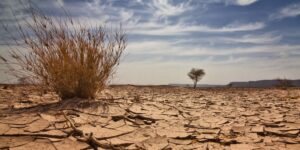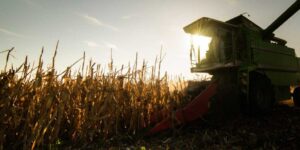Agriculture is the backbone of Pakistan’s economy, contributing 21.3% to the GDP in FY2018. The sector employs 45.3% of the country’s workforce and is a major source of export earnings. However, agriculture in Pakistan is facing a number of challenges. These include water scarcity, declining soil fertility, limited access to markets and inputs, and climate change. In this blog post, we will explore some of the major issues facing agriculture in Pakistan and what can be done to address them.
Water scarcity
Water scarcity is a major issue facing Pakistan’s agricultural sector. With only 5% of the country’s land area classified as arable, and a rapidly growing population, water availability is becoming an increasingly critical constraint on agricultural production.
Pakistan is highly dependent on irrigation for agriculture, as nearly 90% of cropped area is cultivated under irrigated conditions. The majority of the irrigation water comes from surface water sources, such as canals and reservoirs. However, due to the high level of evaporation in the hot and dry climate, only 60-70% of this water actually reaches crops.
In recent years, there has been a decline in the average annual rainfall, further exacerbating water scarcity problems. This has led to a decline in groundwater levels, as well as an increase in the number of days with no irrigation water available. As a result, farmers are being forced to rely more heavily on groundwater for irrigation.
The overexploitation of groundwater resources is causing serious environmental problems, including land subsidence and Salinization (the build-up of salts in soils). In addition, it is estimated that Pakistan will be running out of exploitable groundwater resources within the next 20-30 years.
It is clear that water scarcity is a major challenge facing Pakistan’s agricultural sector. While there are some measures that can be taken to improve efficiency and reduce wastage, it is clear that long-term solutions will require significant investment in infrastructure and technology
Land degradation
The term land degradation refers to the deterioration of physical, chemical, and biological properties of soil. It is a process that can occur naturally or as a result of human activities. Land degradation can have serious consequences for food security, water resources, and the environment.
Pakistan is one of the countries most affected by land degradation. According to a recent report by the United Nations Convention to Combat Desertification (UNCCD), Pakistan has lost more than 20% of its productive land due to desertification. This is an alarming figure considering that Pakistan is already a water-stressed country with a rapidly growing population.
The main cause of land degradation in Pakistan is over-exploitation of natural resources such as forests and water resources. Deforestation is a major problem in Pakistan. According to the Food and Agriculture Organization (FAO), Pakistan has lost nearly 40% of its forest cover since 1990. This has led to soil erosion and loss of fertility, which in turn has resulted in lower crop yields.
Overgrazing is another major problem that contributes to land degradation in Pakistan. About 70% of Pakistan’s livestock are found in rangelands, which are often degraded due to overgrazing. This leads to soil compaction, loss of vegetation cover, and reduced infiltration rates. The end result is reduced productivity of these lands.
Other causes of land degradation in Pakistan include unsustainable farming practices such as excessive use of chemicals and irrigation water, as
Climate change
Climate change is one of the major issues facing agriculture in Pakistan. The country is highly vulnerable to climate change, and its effects are already being felt by farmers. Crop yields are declining, water resources are under stress, and extreme weather events are becoming more frequent.
Pakistan is working to adapt to climate change, but it will be a long and difficult process. In the meantime, farmers need all the support they can get to help them cope with the increasingly challenging conditions.
Over-dependence on chemical fertilizers
The over-dependence on chemical fertilizers is one of the major issues of agriculture in Pakistan. The excessive use of chemical fertilizers has led to the degradation of soil quality, water pollution and health problems for farmers.
The government has been trying to address this issue by providing subsidies on organic fertilizers and banning the use of certain harmful chemicals. However, more needs to be done to promote sustainable agriculture practices in Pakistan.
Declining crop productivity
Pakistan is an agrarian economy and the agricultural sector accounts for about 18.9% of GDP and employs 42.3% of the labor force. The sector is however, beset with a number of problems. One of the major issues facing agriculture in Pakistan is declining crop productivity.
The average yield per hectare of wheat has stagnated at around 2.5 tons over the past decade while the world average yield has increased to 3.5 tons per hectare. The yield per hectare of rice has also remained stagnant at around 2 tons while the world average has gone up to 3 tons per hectare. This stagnation in crop yields is a matter of great concern as it threatens food security in the country.
There are many reasons for this decline in crop productivity. One of the main reasons is the lack of investment in research and development in the agricultural sector. The government spends only 0.3% of its GDP on research and development in agriculture, which is far below the global average of 1%. This lack of investment means that new technologies and practices are not being adopted by farmers, leading to low yields.
Other factors that contribute to low crop productivity include poor irrigation facilities, a lack of access to credit and inputs, and adverse weather conditions. These problems need to be addressed urgently if Pakistan is to increase its agricultural productivity and ensure food security for its people
Shortfalls in infrastructure and research
Pakistan’s agricultural sector is beset by a number of serious problems. One of the most significant is the country’s shortage of quality infrastructure and research facilities. This has hampered Pakistan’s ability to develop its agricultural sector and meet the needs of its growing population.
The lack of quality infrastructure is a major constraint on agriculture in Pakistan. The country has a very low level of irrigation, with only around 40% of arable land being irrigated. This limits the types of crops that can be grown, as well as the yield that can be achieved. In addition, Pakistan has a very low level of mechanization, with only around 10% of farms using tractors or other modern equipment. This makes it difficult to scale up production and meet rising demand.
The lack of quality research facilities is also a major problem for agriculture in Pakistan. The country has only a handful of agricultural research institutes, which are not adequately funded or staffed. This means that new technologies and practices cannot be properly tested or developed. As a result, Pakistani farmers are often reliant on outdated methods, which further constrains productivity growth.
Lack of access to markets
Lack of access to markets is one of the major issues facing agriculture in Pakistan. Small-scale farmers in particular have little to no access to markets, as they lack the resources and infrastructure necessary to get their products to market. This lack of access means that small-scale farmers are not able to sell their products at a fair price, which limits their income and further exacerbates poverty levels in rural areas.
The government of Pakistan has made some effort to address this issue by setting up agricultural marketing boards and providing subsidies for transportation and other inputs, but these initiatives have not been sufficiently effective in addressing the underlying problem. There is a need for more comprehensive and coordinated effort from the government to improve access to markets for small-scale farmers if the agricultural sector is to reach its potential in Pakistan.
Conclusion
The problems facing agriculture in Pakistan are numerous and varied. From water shortages to land degradation, the sector faces a number of challenges. However, with proper government support and investment, the agricultural sector has the potential to thrive. With Pakistan’s large population depending on agriculture for their livelihoods, it is crucial that the issues facing the sector are addressed.
Naila Ikram Bhatti, Islamabad
MSc(Hons.) Agronomy
[email protected]








